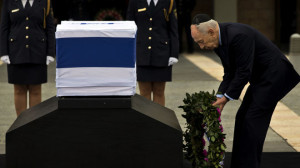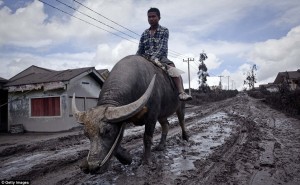redo Jump to...
print Print...
ISRAEL – Israelis pay their respects to former Prime Minister Ariel Sharon
JERUSALEM | Israelis from all walks of life flocked to parliament in Jerusalem on Sunday to catch a glimpse of Ariel Sharon’s coffin and pay their final respects to the iconic former prime minister and general.

Israel’s President Shimon Peres lays a wreath next the coffin of late Israeli Prime Minister Ariel Sharon Sunday, Jan. 12. (AP Photo/Bernat Armangue)
A stream of visitors ranging from former army comrades to political allies to citizens who only knew him from afar remembered Sharon as a decisive leader, for better or for worse, and one of the final heroes of Israel’s founding generation.
“Words escape me. He was just a man who was larger than life,” said a choked-up Shlomo Mann, 68, who served under Sharon’s command in the 1973 Mideast war. “Those who didn’t know him from up close can’t truly understand what a legend he was. There will never be anyone else like him.”
The 85-year-old Sharon died Saturday eight years after a devastating stroke left him in a coma.

Ariel Sharon (R), recovering from a head injury, with Moshe Dayan on the western side of the Suez Canal in October 1973
In a career that stretched across much of Israel’s 65-year existence, his life was closely intertwined with the country’s history. He was a leader known for his exploits on the battlefield, masterminding Israel’s invasion of Lebanon, building Jewish settlements on war-won land and then, late in life, destroying some that he deemed no longer useful when he withdrew from the Gaza Strip.
As one of Israel’s most famous generals, the man known as “Arik” was renowned for bold tactics and an occasional refusal to obey orders. To his supporters, he was a war hero; to his critics, a war criminal.
As prime minister late in life, he was embraced by the public as a grandfatherly figure who provided stability in times of turmoil.
“Arik was, first and foremost, a warrior and a commander, among the Jewish people’s greatest generals in the current era and throughout its history,” Prime Minister Benjamin Netanyahu, a fierce political rival of Sharon in the Likud Party, said Sunday. “I think he represents the generation of Jewish warriors that arose for our people upon the resumption of our independence.”
President Shimon Peres – a lifelong friend and rival – and former Prime Minister Ehud Olmert, who succeeded Sharon after the 2006 stroke, were among those who paused before the closed flag-draped coffin displayed in a plaza in front of the Knesset and surrounded by an honor guard. But the event was mostly an occasion for everyday Israelis to honor him.
INDONESIA – Mount Sinabung eruption intensifies

Authorities extended a danger zone around a rumbling volcano in western Indonesia on Sunday (Jan. 5) after it spewed blistering gas farther than expected, sending panicked residents streaming down the sides of the mountain.
Mount Sinabung’s booming explosion just after midnight triggered a panicked evacuation after more than 50 eruptions on Saturday sent lava and searing gas tumbling out of the volcano in North Sumatra province down the southeastern slopes up to three miles away.
 More than 22,000 people have been evacuated from villages around the crater into several temporary shelters since authorities raised the alert status for Sinabung to the highest level in November.
More than 22,000 people have been evacuated from villages around the crater into several temporary shelters since authorities raised the alert status for Sinabung to the highest level in November.
Gas and ash have ruined crops and homes in the surrounding villages.
The 8,530-foot Mount Sinabung has sporadically erupted since September. An eruption in 2010 killed two people and caught scientists off guard because the volcano had been quiet for four centuries.
Mount Sinabung is among about 130 active volcanoes in Indonesia, which is prone to seismic upheaval due to its location on the Pacific “Ring of Fire,” an arc of volcanoes and fault lines encircling the Pacific Basin.
CHINA – Communist government abolishes its labor camps and releases prisoners
BEIJING | China’s communist leaders appear to have fulfilled a promise to dismantle hundreds of labor camps and release tens of thousands of people who were imprisoned in them without trial.
A series of visits to six enormous labor camps on the outskirts of Beijing suggested that four had been shut down, with their signs removed. Staff said all their prisoners had been released and they were waiting for further orders. The other two camps had been converted; one into a drug rehabilitation centre and the other into the second cell block of a local prison.
Interviews with former labor camp prisoners across China also confirmed that the system has been disbanded and that they had not been placed in any other type of detention.
The Communist party has promised since 2007 to end “re-education through labor,” a relic of Chairman Mao’s era which allowed the police to imprison offenders – including political and religious dissidents – for up to four years without trial, often forcing them to slave in mines and factories, or on farms.
Human rights campaigners have expressed concern that the camps might survive under a different name, or that prisoners would be moved to other facilities such as mental hospitals or secret jails.
An official at Beijing’s Labor Camp Bureau, who only named himself as Mr Zhang, insisted that a new government vote at the end of December had proven decisive, and that all prisoners had now been released and allowed to return home.
“I can be very sure there is no one left inside,” he said. However, he declined to allow access to any of the camps and would not say how many there were in Beijing or in total. Asked how many people were released, he said: “Sorry I can’t tell you, there are some relevant regulations to follow.”
Several dissidents who served time in labor camps confirmed that they had been abruptly released over the past year, had been allowed to return home, and have not been the focus of any other police restrictions.
Jiang Chengfen, a 40-year-old farmer from Sichuan who served a year in a labor camp for criticizing the government, said she had been released abruptly without finishing her sentence. “They did not tell me I was being released, just to go downstairs because someone had come to see me. It was my husband. They had brought him but also not told him I was being released. I had to change my clothes and they pushed me out,” she said. “I was quite puzzled.”
The biggest replacement for the labor camp system appears to be court-mandated “community correction,” which does not involve detention but obliges offenders to report regularly to a drop-in centre and for their communications to be monitored.
“From a legislative point of view, the labor camp system has been abolished,” said Li Fangping, a leading human rights lawyer. “But we need to worry about whether black prisons and mental wards will be used to detain protesters.”
“As for what happens to the facilities, it is difficult to tell. We need to pay attention though. In Jixi, Heilongjiang, the camp is now a ‘legal education base’ which is used for Falun Gong disciples and underground Christians.”
(The news briefs above are from wire reports and staff reports posted at New York Post on Jan. 12, CNN on Jan. 9 and London’s Daily Telegraph on Jan. 9.)
Questions
NOTE: Before answering the questions below, read the information under “Background.”
1. For each of the 3 countries, provide the following information:
a) capital:
b) location/the countries that share its borders:
c) the religious breakdown of the population:
d) the type of government:
e) the chief of state (and head of government if different) [If monarch or dictator, since what date has he/she ruled? – include name of heir apparent for monarch]:
f) the population:
NOTE: Before answering the questions below, read the info under “Background” and watch the videos under “Resources.”
2. For ISRAEL:
a) list the who, what, where and when of the news item
b) Read more about Prime Minister Sharon under “Background” and “Resources” below. What 2 or 3 words best describe Mr. Sharon as a leader? Explain your choices.
3. For INDONESIA:
a) list the who, what, where and when of the news item
b) Apart from recent activity in the past few years, when was the last time Mount Sinabung was active?
c) What is “the Ring of Fire”?
4. For CHINA:
a) list the who, what, where and when of the news item
b) What are Chinese “re-education” or “forced labor” camps? Be specific.
c) The labor camp system was criticized as an “urgent human rights concern” by the United Nations in 2009. At the start of 2013, there were approximately 160,000 people in labor camps, according to Human Rights Watch. What do you think is the Communist government’s motive for apparently closing the labor camps?
Background
ISRAEL
- Ariel Sharon was born February 26, 1928 in the then British Mandate of Palestine to a family of Lithuanian Jews. By the age of 10 he had entered the Zionist youth movement Hassadeh and later the Haganah, the military precursor to the Israel Defense Forces.
- His military career flourished as he became a commander in the Israeli army, celebrated as a military strategist.
- He was an instrumental figure in the 1956 Suez War, the Six Day War of 1967, the Yom Kippur War of 1973 and as Minister of Defense directed the 1982 Lebanon War.
- Sharon joined the Likud party after retiring from the military, serving in a number of ministerial posts and then as party leader in 2000 before becoming prime minister from 2001-2006.
- Widowed twice, he is survived by his sons Gilad and Omri. (from London’s Daily Telegraph)
From the NY Post article above from an Associated Press report:
- Sharon’s life will be remembered for its three distinct stages: First, was his eventful and controversial time in uniform, including leading a deadly raid in the West Bank that killed 69 Arabs, as well as his heroics in the 1973 Mideast war.
- Then came his years as a bold leader who helped create Israel’s settlement movement and masterminded the divisive Lebanon invasion in 1982. He was branded as indirectly responsible for the massacre of hundreds of Palestinians at the Sabra and Chatilla refugee camps outside Beirut when his troops allowed allied Lebanese militias into the camps. An uproar over the massacre cost him his job.
- Yet ultimately he transformed himself into a prime minister and statesman, capped by a dramatic 2005 withdrawal from the Gaza Strip. Sharon appeared to be cruising toward re-election when he suffered his stroke in January 2006.
INDONESIA:
Mount Sinabung is a volcano of in the Karo plateau of North Sumatra, Indonesia, 25 miles from Lake Toba supervolcano. It began spewing gas in September after a three-year slumber and erupted over 220 times last week.
Many old lava flows are on its flanks and the last known eruption, apart from recent times, occurred in the year 1600.
The hot ashes and smoke have caused pyroclastic flows — a fast-moving mass of gas and rocks — to stretch over 4 miles down the southeast slope of the 2,600 8,530 foot mountain in North Sumatra.
Solfataric activities (cracks where steam, gas, and lava are emitted) were last observed at the summit in 1912, other documented events include an eruption in the early hours of August 29, 2010 and eruptions in September, November 2013 and January 2014.
The local government is still able to cope with the disaster, and no casualties have been reported according to Sutopo Purwo Nugroho, spokesman for Indonesia’s national agency for disaster management.
A national emergency hasn’t been declared, but the government is prepared for the “worst case scenario.”
In case of bigger eruptions, the danger zone would be extended to a radius of 6.2 miles from 3 to 4 miles currently.
If the zone is enlarged, Nugroho estimates that 59,000 people would have to be evacuated. (from wikipedia and a Daily Telegraph report)
CHINA
All of Beijing’s recorded labor camps were in Daxing, a dusty grey suburb roughly 50 minutes by car from the city center. Officials at the camps in Daxing declined to allow any access to their respective facilities, but claimed they were now vacant.
“We are still working, but there is not much to do,” said one official at the Xinhe labour camp, who declined to give his name because he did not have permission to speak to the media. “We cannot let you inside though, it is still top secret,” he added.
At the Daxing Women’s Labor Camp, a policeman said staff were awaiting orders. “The government is still deciding what to do with the facility now,” he added. A deliveryman outside the gates said he had made regular drop-offs at the site but that it was now empty.
Guo Qinghua, 46, used to clean the lavatories at the offices of the Standing Committee of the Beijing People’s Congress before an argument over her pay landed her in the Daxing Women’s Labor Camp. Behind the high concrete walls, she said, were three pink dormitory buildings, two for normal prisoners and one for members of the Falun Gong movement (a spiritual movement based on the teachings of its founder, Li Hongzhi), drug addicts and violent inmates.
“At its peak, there were around 700 detainees,” she said. “There was a cattle farm in the camp, a library and a greenhouse. There was also a music room with traditional Chinese instruments, a yoga room and a room like a gym, although those were only for show because they were always closed.”
Ms. Guo said she had been released last May and not placed under any other type of restriction. (from the telegraph article)
Resources
ISRAEL – For a more detailed article on the life of Ariel Sharon, go to wsj.com.
Watch a news report:
INDONESIA – Watch a news report:
CHINA – Watch a news report:
Daily “Answers” emails are provided for Daily News Articles, Tuesday’s World Events and Friday’s News Quiz.



